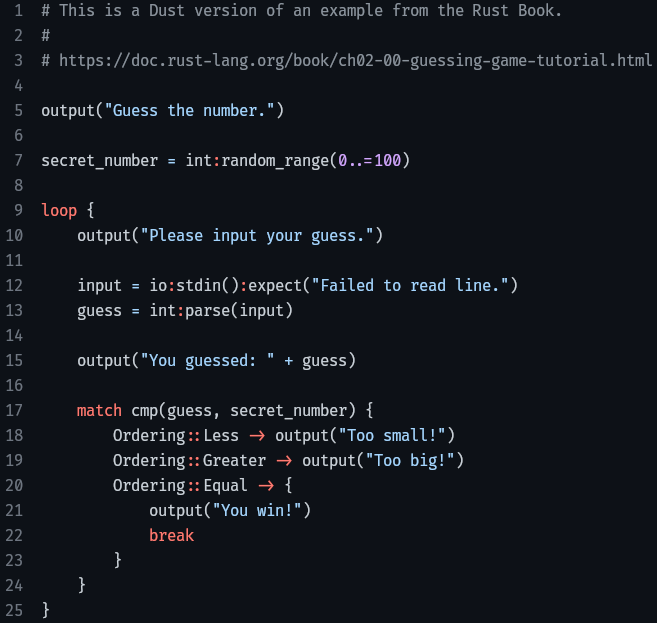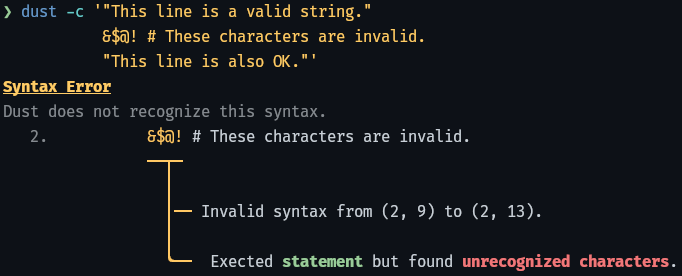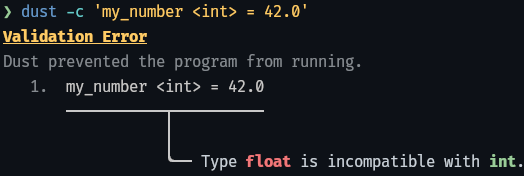Compare commits
1 Commits
| Author | SHA1 | Date | |
|---|---|---|---|
| b7d152be91 |
2
Cargo.lock
generated
@ -369,7 +369,7 @@ dependencies = [
|
||||
|
||||
[[package]]
|
||||
name = "dust-lang"
|
||||
version = "0.4.2"
|
||||
version = "0.4.1"
|
||||
dependencies = [
|
||||
"cc",
|
||||
"clap",
|
||||
|
||||
@ -1,7 +1,7 @@
|
||||
[package]
|
||||
name = "dust-lang"
|
||||
description = "General purpose programming language"
|
||||
version = "0.4.2"
|
||||
version = "0.4.1"
|
||||
repository = "https://git.jeffa.io/jeff/dust.git"
|
||||
edition = "2021"
|
||||
license = "MIT"
|
||||
|
||||
67
README.md
@ -2,24 +2,19 @@
|
||||
|
||||
High-level programming language with effortless concurrency, automatic memory management, type safety and strict error handling.
|
||||
|
||||

|
||||

|
||||
|
||||
<!--toc:start-->
|
||||
- [Dust](#dust)
|
||||
- [Features](#features)
|
||||
- [Easy to Read and Write](#easy-to-read-and-write)
|
||||
- [Effortless Concurrency](#effortless-concurrency)
|
||||
- [Helpful Errors](#helpful-errors)
|
||||
- [Static analysis](#static-analysis)
|
||||
- [Debugging](#debugging)
|
||||
- [Automatic Memory Management](#automatic-memory-management)
|
||||
- [Error Handling](#error-handling)
|
||||
- [Installation and Usage](#installation-and-usage)
|
||||
<!--toc:end-->
|
||||
|
||||
## Features
|
||||
|
||||
### Easy to Read and Write
|
||||
## Easy to Read and Write
|
||||
|
||||
Dust has simple, easy-to-learn syntax.
|
||||
|
||||
@ -27,7 +22,7 @@ Dust has simple, easy-to-learn syntax.
|
||||
output('Hello world!')
|
||||
```
|
||||
|
||||
### Effortless Concurrency
|
||||
## Effortless Concurrency
|
||||
|
||||
Write multi-threaded code as easily as you would write code for a single thread.
|
||||
|
||||
@ -39,62 +34,26 @@ async {
|
||||
}
|
||||
```
|
||||
|
||||
### Helpful Errors
|
||||
## Helpful Errors
|
||||
|
||||
Dust shows you exactly where your code went wrong and suggests changes.
|
||||
|
||||

|
||||

|
||||
|
||||
### Static analysis
|
||||
## Static analysis
|
||||
|
||||
Your code is always validated for safety before it is run.
|
||||
Your code is always validated for safety before it is run. Other interpreted languages can fail halfway through, but Dust is able to avoid runtime errors by analyzing the program *before* it is run
|
||||
|
||||

|
||||

|
||||
|
||||
Dust
|
||||
## Debugging
|
||||
|
||||
### Debugging
|
||||
Just set the environment variable `DUST_LOG=info` and Dust will tell you exactly what your code is doing while it's doing it. If you set `DUST_LOG=trace`, it will output detailed logs about parsing, abstraction, validation, memory management and runtime.
|
||||
|
||||
Just set the environment variable `DUST_LOG=info` and Dust will tell you exactly what your code is doing while it's doing it. If you set `DUST_LOG=trace`, it will output detailed logs about parsing, abstraction, validation, memory management and runtime. Here are some of the logs from the end of a simple [fizzbuzz example](https://git.jeffa.io/jeff/dust/src/branch/main/examples/fizzbuzz.ds).
|
||||

|
||||
|
||||

|
||||
## Automatic Memory Management
|
||||
|
||||
### Automatic Memory Management
|
||||
|
||||
Thanks to static analysis, Dust knows exactly how many times each variable is used. This allows Dust to free memory as soon as the variable will no longer be used, without any help from the user.
|
||||
|
||||
### Error Handling
|
||||
|
||||
Runtime errors are no problem with Dust. The `Result` type represents the output of an operation that might fail. The user must decide what to do in the case of an error.
|
||||
|
||||
```dust
|
||||
match io:stdin() {
|
||||
Result::Ok(input) -> output("We read this input: " + input)
|
||||
Result::Error(message) -> output("We got this error: " + message)
|
||||
}
|
||||
```
|
||||
## Error Handling
|
||||
|
||||
## Installation and Usage
|
||||
|
||||
There are two ways to compile Dust. **It is best to clone the repository and compile the latest code**, otherwise the program may be a different version than the one shown on GitHub. Either way, you must have `rustup`, `cmake` and a C compiler installed.
|
||||
|
||||
To install from the git repository:
|
||||
|
||||
```fish
|
||||
git clone https://git.jeffa.io/jeff/dust
|
||||
cd dust
|
||||
cargo run --release
|
||||
```
|
||||
|
||||
To install with cargo:
|
||||
|
||||
```fish
|
||||
cargo install dust-lang
|
||||
dust
|
||||
```
|
||||
|
||||
## Benchmarks
|
||||
|
||||
## Development Status
|
||||
|
||||
Currently, Dust is being prepared for version 1.0. Until then, there may be breaking changes to the language and CLI.
|
||||
|
||||
|
Before Width: | Height: | Size: 38 KiB After Width: | Height: | Size: 33 KiB |
|
Before Width: | Height: | Size: 67 KiB After Width: | Height: | Size: 67 KiB |
|
Before Width: | Height: | Size: 32 KiB After Width: | Height: | Size: 21 KiB |
|
Before Width: | Height: | Size: 18 KiB After Width: | Height: | Size: 14 KiB |
@ -4,22 +4,22 @@
|
||||
|
||||
output("Guess the number.")
|
||||
|
||||
secret_number = int:random_range(0..=100)
|
||||
secret_number = int:random_range(0..=100);
|
||||
|
||||
loop {
|
||||
output("Please input your guess.")
|
||||
|
||||
input = io:stdin():expect("Failed to read line.")
|
||||
guess = int:parse(input)
|
||||
guess = int:parse(input);
|
||||
|
||||
output("You guessed: " + guess)
|
||||
|
||||
match cmp(guess, secret_number) {
|
||||
Ordering::Less -> output("Too small!")
|
||||
Ordering::Greater -> output("Too big!")
|
||||
Ordering::Less -> output("Too small!"),
|
||||
Ordering::Greater -> output("Too big!"),
|
||||
Ordering::Equal -> {
|
||||
output("You win!")
|
||||
break
|
||||
output("You win!");
|
||||
break;
|
||||
}
|
||||
}
|
||||
}
|
||||
|
||||
@ -11,7 +11,7 @@ hyperfine \
|
||||
--shell none \
|
||||
--parameter-list data_path examples/assets/seaCreatures.json \
|
||||
--warmup 3 \
|
||||
"target/release/dust -c 'length(json:parse(fs:read_file(\"{data_path}\")))'" \
|
||||
"dust -c 'length(json:parse(input))' -p {data_path}" \
|
||||
"jq 'length' {data_path}" \
|
||||
"node --eval \"require('node:fs').readFile('{data_path}', (err, data)=>{console.log(JSON.parse(data).length)})\"" \
|
||||
"nu -c 'open {data_path} | length'"
|
||||
@ -20,7 +20,7 @@ hyperfine \
|
||||
--shell none \
|
||||
--parameter-list data_path examples/assets/jq_data.json \
|
||||
--warmup 3 \
|
||||
"target/release/dust -c 'length(json:parse(fs:read_file(\"{data_path}\")))'" \
|
||||
"dust -c 'length(json:parse(input))' -p {data_path}" \
|
||||
"jq 'length' {data_path}" \
|
||||
"node --eval \"require('node:fs').readFile('{data_path}', (err, data)=>{console.log(JSON.parse(data).length)})\"" \
|
||||
"nu -c 'open {data_path} | length'"
|
||||
@ -29,7 +29,7 @@ hyperfine \
|
||||
--shell none \
|
||||
--parameter-list data_path dielectron.json \
|
||||
--warmup 3 \
|
||||
"target/release/dust -c 'length(json:parse(fs:read_file(\"{data_path}\")))'" \
|
||||
"dust -c 'length(json:parse(input))' -p {data_path}" \
|
||||
"jq 'length' {data_path}" \
|
||||
"node --eval \"require('node:fs').readFile('{data_path}', (err, data)=>{console.log(JSON.parse(data).length)})\"" \
|
||||
"nu -c 'open {data_path} | length'"
|
||||
|
||||
@ -1,4 +1,4 @@
|
||||
use std::{fs::File, io::Read};
|
||||
use std::fs::read_to_string;
|
||||
|
||||
use enum_iterator::{all, Sequence};
|
||||
use serde::{Deserialize, Serialize};
|
||||
@ -46,11 +46,7 @@ impl Callable for Fs {
|
||||
RuntimeError::expect_argument_amount(self.name(), 1, arguments.len())?;
|
||||
|
||||
let path = arguments.first().unwrap().as_string()?;
|
||||
let mut file = File::open(path)?;
|
||||
let file_size = file.metadata()?.len() as usize;
|
||||
let mut file_content = String::with_capacity(file_size);
|
||||
|
||||
file.read_to_string(&mut file_content)?;
|
||||
let file_content = read_to_string(path.as_str())?;
|
||||
|
||||
Ok(Value::string(file_content))
|
||||
}
|
||||
|
||||